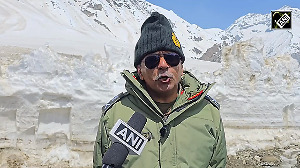Farmer leaders taking part in the 'Delhi Chalo' agitation on Monday rejected the Centre's proposal of procuring pulses, maize and cotton at minimum support price by government agencies for five years, saying it was not in farmers' interest and announced that they will march towards the national capital on Wednesday.

"We appeal to the government that either resolve our issues or remove barricades and allow us to proceed to Delhi to protest peacefully," Kisan Mazdoor Morcha leader Sarwan Singh Pandher told reporters at the Shambhu point of Punjab's border with Haryana.
In the fourth round of talks with farmer leaders, a panel of three Union ministers on Sunday proposed buying of pulses, maize and cotton crops by government agencies at minimum support prices for five years after entering into an agreement with farmers.
Earlier on Monday, Samyukta Kisan Morcha, which spearheaded the 2020-21 farmers' stir, rejected the government proposal, saying it seeks to "divert and dilute" the farmers' demand for MSP and they will accept nothing less than the 'C-2 plus 50 per cent' formula for MSP as recommended in the Swaminathan Commission report.
In the evening, Jagjit Singh Dallewal, a leader of SKM (Non-Political) that is spearheading the 'Delhi Chalo' march along with the Kisan Mazdoor Morcha, said, "After holding discussions in our two forums, it has been decided that the Centre's proposal is not in the interest of farmers and we reject this proposal."
When asked if their call for march to Delhi still stands, Pandher said, "We will move to Delhi peacefully at 11 am on February 21." He said the government should take decisions now and felt that there was no need for further discussions.
Sharing with reporters the reasons for rejecting the government's proposal, Dallewal said, "We did not find anything in the proposal."
He said that in the fourth round of talks, the Union Ministers had said if the government gives a guarantee on MSP for pulses, then it will put an additional burden of Rs 1.50 lakh crore on the exchequer.
Citing the calculations of an agricultural expert, Dallewal said Rs 1.75 lakh crore will be needed if the minimum support price is given for all crops.
The government buys palm oil worth Rs 1.75 lakh crore. The oil is becoming a reason for disease for many people. Even then, it was being imported and if this Rs 1.75 lakh crore is spent on growing other crops by ensuring legal guarantee for MSP then it will not put any burden on the government, he said.
He further said the Centre's proposal of buying five crops at the MSP will only be meant for those who go for crop diversification. It meant that the MSP would be given to those only who switch over from paddy to pulses. It will not be given to those growing 'moong' crops besides paddy, Dallewal said.
Farmers are not going to benefit from it, he asserted, adding that farmers were demanding MSP on all 23 crops and the MSP was based on the recommendations of the Commission for Agricultural Costs and Prices.
Dallewal claimed that the rates for crops, based on CACP recommendations, could not ensure remunerative income for farmers. "Even then they could not bring a law on MSP. It means farmers are being looted which is not acceptable to us."
Farmer leaders said the proposal in the meeting was that five crops would be bought from farmers across the country but it was meant for only those who diversify from paddy crops.
Asked whether they will join hands with the SKM, Pandher said if anybody wants to join the agitation, they have an open invitation to fight for the rights of farmers and farm labourers.
When asked what would be the next course of action for the farmer leaders if the model code of conduct is imposed, Dallewal said, "We will sit again and discuss what shape is to be given to the agitation."
On the suspension of Internet services in certain areas of Punjab, Pandher said students preparing for examinations were suffering.
Replying to a question, Dallewal said the main reason for inviting Punjab Chief Minister Bhagwant Mann to the meetings was to raise the issue of barricading along the state borders and that the people of Punjab were facing tear gas shelling inside the state's territory.
Mann had assured us of taking note of the situation but he has not done so till now, he said. "The Haryana DGP, in a statement, said that they have not used tear gas or pellet guns. If no such order was given, then how come 400 people got injured? Why is the Haryana government not acting on the matter," he asked.
Both Dallewal and Pandher said they did not want to break the barricades and wanted to move towards Delhi peacefully. Pandher said that they had earlier sought a place at Jantar Mantar to hold their protest, but the government has not responded.
"We only want to get our demands met, but if the government does not listen, then we are compelled. On one side are the farmers, on the other side are the 'jawans' (police and paramilitary). We do not want any violence. If the government indulges in 'jabar' (oppression), then people of the country will think whether such people should be in power or not," Pandher said.
Protesting farmers have been staying put at Shambhu and Khanauri points on Punjab's border with Haryana after their 'Delhi Chalo' march to press the Centre for various demands, including a legal guarantee of minimum support price for crops, was stopped by security forces which led to clashes last week.
Besides a legal guarantee of MSP, the farmers are demanding the implementation of the Swaminathan Commission's recommendations, pension for farmers and farm labourers, farm debt waiver, no hike in electricity tariff, withdrawal of police cases and "justice" for the victims of the 2021 Lakhimpur Kheri violence, reinstatement of the Land Acquisition Act, 2013, and compensation to the families of the farmers who died during a previous agitation in 2020-21..












 © 2025
© 2025